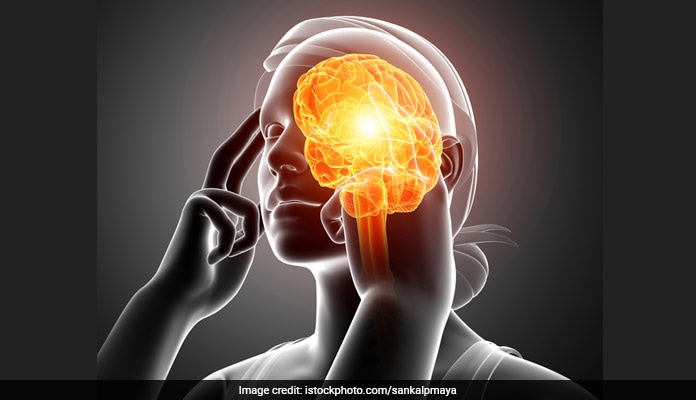World Brain Tumor Day: In order to cope with today's fast paced world, we often end up overworking ourselves and not pay it the attention that it deserves. Due to this many at times we sometimes end up ignoring certain warning signs that could potentially lead to a brain tumour.

World Brain Tumor Day: Symptoms appear when it starts exerting pressure on the brain
HIGHLIGHTS
- A headache is a very common occurrence with brain tumour
- Having seizures and fits can also be a symptom of brain tumour
- Blurred vision and declining eye sight are also its symptoms
Since brain tumor come in all shapes and sizes, so do their symptoms. Much depends on the position of a tumor and how fast it develops. Symptoms appear when it starts exerting pressure on the brain, and this affects the brain's functioning in a certain area. Since the various parts of the brain have different roles, the symptoms will vary according to where the disease has developed. For example, if you have a tumor near the part of your brain that controls your arm or your eyesight, your symptoms may include limb weakness or blurry vision. Still, some signs and symptoms are more common than others.
World Brain Tumor Day 2018, learn all about the signs and symptoms of brain tumor.
1. Persistent Headaches
A headache is a very common occurrence with no shortage of possible causes. However, this can make it very difficult for you and even doctors to tell the difference between a headache that is caused by a brain tumor and one that is the result of another cause. Hence, it is important to watch out for new, persistent headaches that get worse when you cough, bend and sneeze and doesn't improve with regular medications.

Photo Credit: iStock
2. Seizures or Fits
A mention of seizures or fits usually brings the disease of epilepsy to mind, but it could also be a symptom of a brain tumor. Information doctors gather shows that this is one of the most frequent symptoms. About 60% of brain tumor patients experience seizures. Depending on the location of a tumor, the seizure can be generalized, affecting the entire body, or partial, resulting in spasms in a specific group of muscles or affecting specific nerves. Partial seizures are probably more common in the initial stages. Some people may notice a warning signal before the seizure occurs, like a headache, nausea, or dizziness.
3. Vision Problems
While this symptom might appear to be a huge red flag to go see a doctor, for many patients, they might not even recognize or notice the symptom at all - let alone associate it with a brain tumor, due to a subtle, not sudden disturbance in vision. Some of the difficulties include noticing flashing lights, blurred vision, double vision, floating shapes and declining eyesight that switches between good and bad on a recurrent basis.

4. Speech Problems
A tumor that is present in the brain can easily affect speech patterns and ability. You may slur, stutter, speak haltingly, grope for appropriate words, muddle words, forget names of common objects, and be unable to string a meaningful sentence together. All of these are signs of dysphasia or aphasia- difficulty in using and understanding language, which can be caused by a brain tumor.
5. Loss of Memory
Most patients who have had brain tumor claim to suffer from memory loss, lack of focus and concentration and difficulty to process information, especially if the tumor lies in the frontal or temporal lobe. You may forget objects, people, places, or events you knew before you got the tumor (long-term memory) or forget most information about events that happened ever since you got the tumor (short-term memory).

6. Changes in Behaviour
Since the brain plays a heavy role in mental health, some symptoms of a brain tumor would manifest themselves in that way. Depending on the location and the growth rate of the tumor, your personality traits may change noticeably or subtly. Patients often report becoming easily agitated and angry, irritated, depressed, confused, and/or prone to risky behaviour such as acting overtly sexual and demonstrating fewer inhibitions, with no prior history of such behaviour.
7. Loss of control over bodily movements
Part of our brain is also responsible for motor functions in the body. When a tumor upsets a certain part of the brain related to your body's motor functions, it could cause a certain lack of control over some bodily movements and functions. This lack of monitoring may express itself in various ways like loss of balance, lack of coordination in the limbs, trouble swallowing, and numbness or weakness in one side of the body.
If you or anyone you know has exhibited any of the symptoms on this list, we encourage you to avoid ignoring them and visit a doctor, preferably a Neurosurgeon as early as possible.
Happy World Brain Tumor Day!
DoctorNDTV is the one stop site for all your health needs providing the most credible health information, health news and tips with expert advice on healthy living, diet plans, informative videos etc. You can get the most relevant and accurate info you need about health problems like diabetes, cancer, pregnancy, HIV and AIDS, weight loss and many other lifestyle diseases. We have a panel of over 350 experts who help us develop content by giving their valuable inputs and bringing to us the latest in the world of healthcare.














